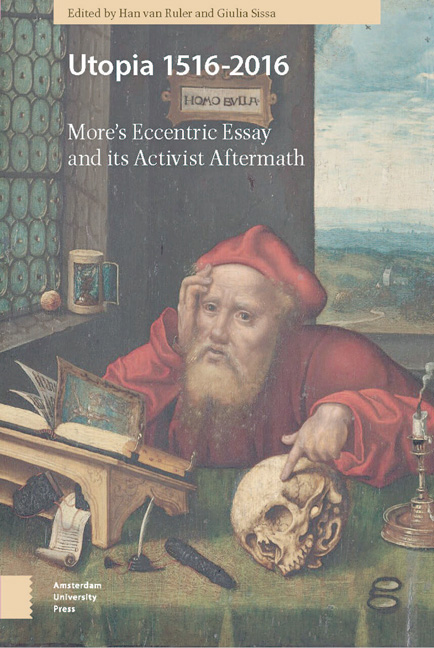Book contents
- Frontmatter
- Contents
- Introduction
- PART 1 THE BOOK
- A Praise of Pain: Thomas More’s Anti-utopianism
- Bodies, morals, and religion: Utopia and the Erasmian idea of Human Progress
- PART 2 ORIGINAL RECEPTION
- Realism Vs Utopianism: The Problem of the Prince in the Early-Modern Netherlands
- From Thomas More to Thomas Smith: Utopian and Anti-Utopian Understandings of Economic Change in Sixteenth-century England
- PART 3 PHILOSOPHICAL CRITICISM
- Reflections on the Utopian Mind
- Utopianism in Today’s Health Care
- PART 4 PHILOSOPHICAL ACCLAIM
- Utopianism and its Discontents: A Conceptual History
- The integrity of Exacerbated Ambiguity: More’s Utopia as an Evaluative Thought Experiment
- Index
The integrity of Exacerbated Ambiguity: More’s Utopia as an Evaluative Thought Experiment
Published online by Cambridge University Press: 12 December 2020
- Frontmatter
- Contents
- Introduction
- PART 1 THE BOOK
- A Praise of Pain: Thomas More’s Anti-utopianism
- Bodies, morals, and religion: Utopia and the Erasmian idea of Human Progress
- PART 2 ORIGINAL RECEPTION
- Realism Vs Utopianism: The Problem of the Prince in the Early-Modern Netherlands
- From Thomas More to Thomas Smith: Utopian and Anti-Utopian Understandings of Economic Change in Sixteenth-century England
- PART 3 PHILOSOPHICAL CRITICISM
- Reflections on the Utopian Mind
- Utopianism in Today’s Health Care
- PART 4 PHILOSOPHICAL ACCLAIM
- Utopianism and its Discontents: A Conceptual History
- The integrity of Exacerbated Ambiguity: More’s Utopia as an Evaluative Thought Experiment
- Index
Summary
Abstract
Although Thomas More is an exemplary figure of both personal and moral integrity, his Utopia is not straightforwardly ‘integer’ in another meaning of the term, i.e., it does not unequivocally describe a ‘whole, intact or pure’ conception of the ideal society. Rather, Utopia is patently ambiguous and challenges the reader to disambiguate the narrative and to make up his own mind on how to construct the ideal society. In this paper, I analyze utopias and dystopias in general as evaluative thought experiments that appeal to our imagination and deploy possible worlds. Subsequently, I argue that More's Utopia is a successful evaluative thought experiment that actually underscores More's integrity, because by means of its exacerbated ambiguity, it both triggers and properly respects the deliberation and evaluation of the reader in his capacity as thought experimenter.
Keywords: Utopia, thought experiment, ambiguity, integrity
Introduction
In Robert Bolt's famous play and Fred Zinnemann's even more famous film A Man for All Seasons, Thomas More is portrayed as a man of great integrity, both personally and morally. Facing enormous pressure to recant, he firmly stands by his judgement. However, ‘standing for something’ is not in itself sufficient for integrity. After all, fanatics also stand by and act according to their convictions under great pressure, and they can hardly be considered ‘integer’. What is it then that marks out Thomas More's integrity? Recently, Greg Scherkoske has suggested that integrity is not so much a moral, but rather an epistemic virtue. Basically, it is a stable disposition to develop and maintain firm beliefs in an epistemically responsible way, and to act according to one's convictions. On Scherkoske's account, it is precisely their remarkable cognitive success that explains why other, less cognitive successful people put so much trust in integer persons, often consult them and take their advices to heart. Clearly, Thomas More is an exemplary figure of this kind or conception of integrity, most dramatically embodied in his chancellorship and the evolution of his relationship of trust with King Henry VIII.
Given Thomas More's ‘epistemic integrity’, readers who want to be advised on the ideal state, quite naturally turn their attention to his famous book Utopia.
- Type
- Chapter
- Information
- Utopia 1516-2016More's Eccentric Essay and its Activist Aftermath, pp. 225 - 238Publisher: Amsterdam University PressPrint publication year: 2017



